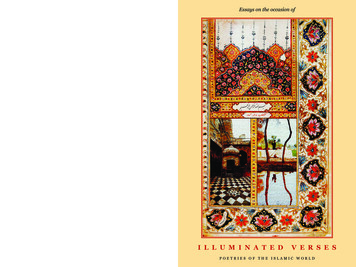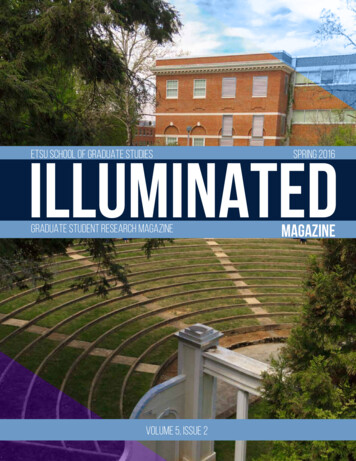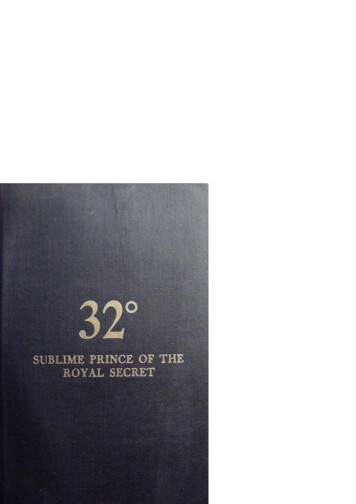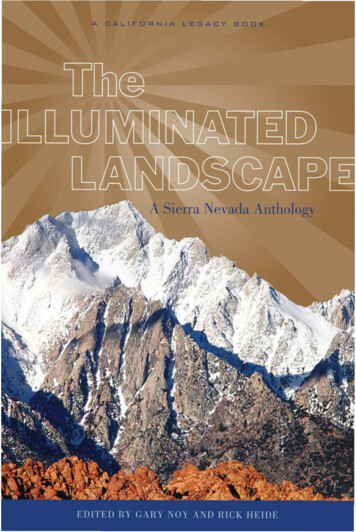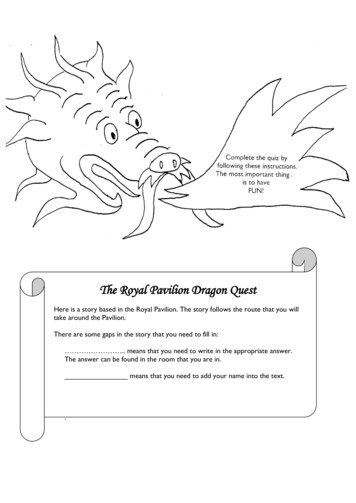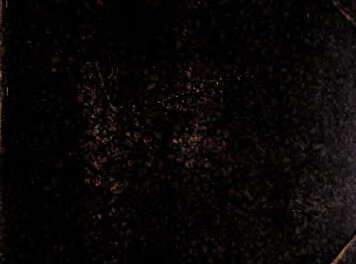
Transcription
.V'f. ,:' -'*'W -/*--.-V,, .tj- -i' -Vvf '1c ,y.n;:v,-Jv;r -.-V:.;.f;-c'r V -,.:w-\:.&. *. y--.- x ;v,, . 3A« s\\Nve c. . .' 'c'J. - * * -N-- : ‘ -; - -.v . ’ '-:M.V. . V-'V.L-.r ;
%
THE ROYAL ILLUMINATEDBOOK OF LEGENDS.Narrated in Antient Ballad Form.WITH APPROPRIATE MUSIC,glrrangeti in an easy style, for Foice anti pianoforte, suited to little Jfolfes or great Jolfes,anti Minstrels of all degrees.Each Story, or Legend,\ illustrated by a set of brilliant Pictures, designed in thequaint spirit of Mediceval times, and printed in Colors and Gold,,ByMARCUS WARD, Illuminator to THE QUEEN.EDINBURGH: WILLIAM P. NIMMO.
William H, Floyd LECTION.JO.
ft b2-/3IINDEX.Pocahontas: a Tale of Old Virginie.Told in verse by FRANCIS DAVIS ; Music composed by B. Hobson Carroll.Plate I.—Pocahontas Saveth the Life of Captain Smith.„ II.—Pocahontas Overheareth the Council of War.Plate III.—Pocahontas Forewarneth the Garrison of James town.»IV.—Piping Times of Peace, Marriage of Pocahontas.King Alfred and Othere (The Discoverer of the North Cape).Poetry by LONGFELLOW.Plate I I" {Issued in the United States by kind permission of Messrs. J. R. Osgood & Co., Publishers.Music composed by B. Hobson Carroll.“ Brought a snow-white Walrus-tooth,Which he held in his brown right hand.”“ For the old seafaring menCame to me now and then.”Plate III.”/“Round in a fiery ring( Went the great sun, O King.”J “ We killed of them threescore,' I And dragged them to the strand.”The Marquis of Carabas; or. Puss in Boots.Told anew, in verse, by FRANCIS DAVIS; Music composed by B. Hobson Carroll.Plate I.—The Miller’s Legacy.„ II.—Puss Presenteth the Rabbit to the King.Plate III.—Puss Visiteth the Ogre.„IV.—The Marriage Feast.The Hind of the Forest; or, the Enchanted Princess.Told anew, in verse, by FRANCIS DAVIS ; Music composed by B. Hobson Carroll.Plate I.—The Fairy Appeareth to the Queen.„ II.-—Grizzel Deceiveth Prince Warrior.Plate III.—The Hind Seeketh Refuge with Gillyflower.,,IV.—End of the Enchantment.
POCAHONTASA Tale of Old Vlrginie.
POCAHONTAS: A TALE OF OLD VIRGINIE.TOLD IN VERSE BY FRANCIS DAVIS.I.Come hither, thou, our wingM steed,And fit thee for a flight,We mean to blow our oaten reedOn Yankee land to-night.To march with royal rhyming foot,Where Raleigh learned, they say,To whiff the weed and raise the rootWe prize so high to-day !II.Where all for her, his Virgin Queen,The lands he called and claimed,—Poor Raleigh !—how he closed his scene,Needs hardly here be named!He had his day, for good or ill,Whereof remains, we know,For good or ill, a remnant still—Eh, pipe of mine 1—heigh-ho !III.Enough!—from him and his we pass,Premising, by the way,We’re in the land where he, I guess,Had been as safe to stay !And from what’s “ ole Virginie,” now,We pluck the veiling years,Till young Virginia's savage browWith all its scars appears !IV.And Jamestown Fort, and Caj tain Smith,Arise upon our view,Where English lads, of pluck and pith.At times look rather blue !For cold and want, and petty feuds,And Indian treacherie,Cut up with bloody interludes,That infant colonie.V.Till, like some streak of tinted light,That sheds a soothing sheen.Where all is drear, or almost night,An Indian maid is seen!Young Pocahontas, she whose nameLike sunlight sheets our song—I wot, along the aisles of FameThat name hath journey’d long !Marcus Wards Royal Illuminated Legends.]VI.XI.A princess she, the fav’rite childOf mighty Powhattan;Oh, ne’er, where flowers were bright as wild,Was brighter seen by man!But, Powhattan 1—ah, well! we know,From many a scraggy tree,A pleasant bough, at times may growAnd blossom fair to see!“ Here’s Swaggs, to squelch the varmintWhatever hour ye will!—[breed,Ye know one, Swaggs 1 Not ye, indeed—His courage or his skill!Why, see, my mates ! by all—well, no !You’re right! I shall not swear !But when in Holland—tally-ho !—Ha! Swaggs was known out there !”vn.Old Pow had ways, if one must tell,“ Good Templars ” wont admire :In sooth, such streams he loved too wellAs largely smacked of fire !Some other weaknesses he showed—We call them such !—in fine,He loved a row; and, when he could.On some fat friend to dine !VIII.In sooth, his love for human ham,And morsels in that way,Was such, or half we say’s but sham,As, sometimes, stept astray—And yet, as oft regained its feet,By logic which implied,That friendship never tastes so sweet,As when the friend is fried!—IX.Which learned view still suits a few,In fifty forms to-day !But, Jamestown Fort we’ve here anew,Let’s view it on our way !A rugged spot, this, sure enough,And colonized, we see,With smoother some, and some as roughAs soldiers well can be.X.Brave fellows, though!—that SergeantA hero without guile,[Swaggs,Though “not a man of boasts or brags !”Doth swear—right Flanders' style !“Our Captain’s on a visit gone !”Quoth he, “ And, by—Pshaw !If bring he not old Powhattan,A pris’ner, beak and claw,XII.Well, valour is a gift, no doubt,And easy to be borne;But if we wait to hear this out,Our patience might be worn.So, we the Indian village seek,Where, lo ! in his wig-wam,The grand old chief, serene and sleek,Hath dreams of human ham !XIII.Beside him sits his friend, a white,’Tis Captain Smith, we know;And Pocahontas, young and bright,There glideth to and fro !Without, and red as rising day,An Indian youth appears,Who, by the way, in love, they say,Is over head and ears.XIV.A fearful way, ’twould seem, to die;But taste, of course, is all!/think, with Smith, we still should tryTo give this Love the wall!For oft gives he, with foul intent,As to this youth we’ve seen,Such sight as sees—if not askant—What poets mean by “green 1”XV.He seeth Smith, and, right or wrong,His eye this green assumes,Poor Smith ! for you it wont be long,His Prairie Flower blooms !He knows the tastes of Powhattan,Of Pocahontas, too,—He knows himself not quite the manTo suit the maiden’s view;XVI.And so he contemplates a roastOf what, however goodAs living man, when done as toast,Should still be doubtful food.So, Powhattan he whistles on—“ I’ll tell you what," said he,“ I think we should link on the pan—The fire's not bad, I see !XVII.“For me, in fact, the thing is this—I feel I need a snack;And think I see one, not amiss,Along that white man’s neck !”“Oh, happy thought 1” said Powhattan,Be scorned, the recreant day,When Powhattan shall, as a man,Say ‘ No !’ unto his ‘ Tay!’”XVIII.So, straightway, on his braves he calls,And, closing half an eye,“ I think, if nicely done, in smalls,Yon friend of ours should fry !”His braves a most approving nodUpon their chief bestow,And soon poor Smith, along the sodLies, waiting for the blow.XIX.And now, the clubs and tomahawksHang o’er the poor white man,While, arms a-kimbo, stands or stalks,Beside them, Powhattan.The moment comes—the club is swung—Is just about to fall,When Pocahontas—oh, that tongue !That bound—-that maid—that all!XX.She flees, she shrieks, and shrieking flees,And o’er the victim bends ;And, shielding him, upon her knees,Her arm the maid extends.“With Pocahontas, as thou wilt,Be done !” she sternly said ;“ But here is blood shall not be spilt—This white man’s heart is red /”
.]Marcus Ward's Royal Illuminated Legends
—p—v-0—9s»rrtlIN d-1to--l!S- - MN#0 0 F 0 01- i r 1«ar11knight was he!—an English knight! God bless the mark—’tis grand! But who wasA L”71 WII1\ vvt -9v-9 —1* y ‘ tr—u-1/wsh E]J!*i--J 9—-J *"!0 i!j2a0Cl!J, j*994m! rL.]Marcus Ward's Royal Illuminated Legends-& ? . neiher own light, A0#111 1a-a1EpC-p1rt—-1--1-T“ M es 3 ' d 1L»WL00 * - 1 - 0 TL0ITT0—3»ii 1Jit JffmPrincessJ—-0rofthe irit -land!JJPr#!4i!E 1 » r yP1"Lf—— 0---*»-*m o ‘rjL — rC . —*--
POCAHONTAS: A TALE OF OLD VIRGINIE —Continued.TOLD IN VERSE BY FRANCIS DAVIS.XXI.Poor girl! and could it be she lovedThis haughty English knight 1If so, what then 1 hath he been provedMore lovely, in God’s sight!A knight was he !—an English knight!God bless the mark—’tis grand !But who was she ? In her own light,A Princess of the land !XXII.Away, away, with “if” and “and,”We hold that man is man,Nor more, nor less, howe’er he stand,With knight or Powhattan !And so, old Pow—who loved his child,Besides a friend, to grill,With appetite a little wild—Was somewhat human still.XXIII.“Away !” said he, “we grant his lifeTo your misguided voice;You yet may be a white man’s wife—To, maybe, rue your choice !”Thus sentimental Pow had grown ;For us, we’re not of mind,In sentimental chat, alone,To waste our honest wind 1XXIV.So, turn to Jamestown Fort, I pray—We can’t forget our friends !Though on our way, I grieve to say,Are awkward odds and ends.For instance, Smith set free, we find,Has wrought the Reds despair:They’ll storm the Fort! Well, never mind,One Sergeant Swaggs is there 1XXV.We know he’ll meet them, one for ten,At least, he swore he would;And surely we, as trustful men,Believe whate’er we should 1A noble night for war or spree !The moon is out, and lo !A silver punch-bowl might she be,For aught our neighbours know—.]Marcus Wards Royal Illuminated LegendsXXVI.She shines so bright—so silvery white,While stars of richest sheen,Like golden goblets, left and right,Complete the jovial scene !Less bright beneath, the Council sits,But wheels the bottle, free,’Mong chiefs and braves, while rolls, by fits,Some huge-voiced melodie !XXVII.And though the chiefs had dress’ed in haste,Each brain its worth made clear,And not alone its worth, but tasteBy aptly-regal gear!And if some tastes dissentious be,Our scullery bear the braid :It aped to them our armourie,On their most recent raid !XXVIII.Howe’er they’re there, in royal state,As, witness their attire :Their very helms—like one, of late—Have been baptized with fire !One brow from ’neath a saucepan beams,Whose handle brooks it well;If it but act the horn it seems,Queer news it yet may tell!XXIX.Another wears what horns he may;But royal Powhattan—A broth-pot, grandly stuffed with hay,Reveals the kingly man !Well, what are they—or what are we—As shaped by time and tide ?Oh, could we see through wall or tree,There might be less to chide!XXX.For trees, as well as walls, have ears;And every evil vow,Perhaps, some Pocahontas hears,As doth that maiden now !But strangers we to King and Court,’Twere best to move our legs ;And, now behold, we’re at the Fort,And here’s our noble Swaggs !,XXXI.He sniffs a something in the wind—Ah, well, he’s well prepared ;O’er one to fear so bravely blind,Our pity may be spared !And still he straineth with those eyes,Whene’er the branches shake.Ye’d think his hair had tried to rise,To keep itself awake !XXXII.A sound there steals along the gale—The sound of sudden feet—I did not think this Swaggs so pale,When first our fate to meet!Ah, well, at night, these northern airsAre bleaching things, we know,But Courage kills a thousand cares—Now, Swaggs !—Ho-ho ! Ho-ho !XXXIII.In vain—in vain ! he’s down like lead,His feet are in the air ;The man—he surely is not dead !Whatever dropped him there iBehold, a red-skinned face there nearsThe Fort, or outer wall—’Tis Pocahontas’ self appears—A maiden, after all!XXXIV.Brave Swaggs he saw, and bravely thoughtThe Indians were around,And how they might be better fought,He’d gather from the ground. .Well, poets, some, I’ve heard them say,Their jingles string in bed ;And may not Swaggs, as brave as they,For study plank his head 1XXXV.I know not did he e’er explainWhat form of fight he planned ;But if he did my craven brainCould hardly understand !I only know, had I been Swaggs,And dreams of danger there,I’d, likely, too, have used my legs,But—scarce so high in air !XXXVI.Howe’er, ’tis Pocahontas stands,And soon her tale is told :She telleth of the angry bandsAbout to stcrrm the hold ;But Smith was not to be outdoneBy Indian craft or guile—The tale through many a stave might run—Alternate tear and smile !' XXXVII.But many staves, like many books,Are weariness of brain;So, many moons have crossed the brooks,Yet Jamestown doth remain.Yea, more, one eve, it looked as brightAs any English scene—For Pocahontas, to a white,That morning wed had been !XXXVIII.And many a reeking pipe and dramWent round both maid and man,With never a sigh for human hamFrom crump, old Powhattan !From early morn till late at night,They frisked it, heel and toe—The bride, to Sergeant Swaggsf delight,St-ill timing with her bow.5XXIX.But Smith’s not there—some English bow’rFor him some white rose bore ;Though well he knew our prairie flow’rHad loved him in her core !And lo ! in London when they met,In long, long after years,How oft her paling bloom was wet,With true soul’s chastest tears !XL.For though our tale, from Fancy’s wing,Some tinted down displays,The beauteous Indian maid we sing,Once charmed the London gaze !“ La Belle Sauvage !” there found she rest,Oh, softly sleep may she !And, radiant as the golden west,Be flower’d her memorie !
V f .;-:1r:. Bpy§la- gfc a1 § If// 5fjA i(33]PSS 1JalfSsspwF ;0,.FA/uy'Alt'’‘‘ TMi /T-"/VV* / 1MH jtj nrifi1P ,CAf}Of)TAS SAV T ) -yS-LyFeOF- CAPTAt f}6 * S ITf}
iliirnlmffllll
Si/, y —w»»v a )/} vijKLjpfs's SH4/ c ds\L gjP*TBr TJ . 4? LOiMJ\t'A/* S vuyj W’W? Wm ilA.xlUkmSvr wBrai'llfflr Tr g«K*r v 4l,f 18RWlTs38 -fcVV Wi /TTfAARCUS VaRD S C y -pypyf7 5 Ty eS OF P AC CARRIAGE OF-POCATjdf T/
/J I,( On/nKING ALFRED AND OTHERE(The Discoverer of the North Cape).By H. W. LONGFELLOW.Issued in the United States by kind permission of Messrs. J. R. Osgood & Co., Publishers.
KING ALFRED AND OTHERE. THE DISCOVERER OF THE NORTH CAPE.BYH.W.LONGFELLOW.Issued in the United States by kind permission of Messrs. J. R. Osgood & Co., Publishers.I.Othere, the old sea-captain,Who dwelt in Helgoland,V.IX.“ So far I live to the northward,“ Of Iceland and of Greenland,N o man lives north of me;And the stormy Hebrides,To King Alfred, the Lover of Truth,To the east are wild mountain-chains,And the undiscovered deep ;—Brought a snow-white walrus-tooth,And beyond them meres and plains ;I could not eat nor sleepWhich he held in his brown right hand.II.H is figure was tall and stately,Like a boy’s his eye appeared;To the westward all is sea.VI.“ So far I live to the northward,From the harbour of Skeringes-hale,For thinking of those seas.X.“To the northward stretched the desert,How far I fain would know ;His hair was yellow as hay,If you only sailed by day,So at last I sallied forth,But threads of a silvery greyWith a fair wind all the way,And three days sailed due north,Gleamed in his tawny beard.III.Hearty and hale was Othere,His cheek had the colour of oak ;More than a month would you sail.VII.“ I own six hundred rein-deer,With sheep and swine beside; -As far as the whale-ships go.XI.“To the west of me was the ocean,To the right the desolate shore,With a kind of laugh in his speech,I have tribute from the Finns,But I did not slacken sailLike the sea-tide on a beach,Whalebone and reindeer-skins,.For the walrus or the whale,As unto the King he spoke.IV.And ropes of walrus-hide.VIII.And Alfred, King of the Saxons,“ I ploughed the land with horses,Had a book upon his knees,But my heart was ill at ease,Till after three days more.XII.“ The days grew longer and longer,Till they became as one,And wrote down the wondrous taleFor the old seafaring menAnd southward through the hazeOf him who was first to sailCame to me now and then,I saw the sullen blazeInto the Arctic seas.Marcus Ward's Royal Illuminated Legends. JWith their sagas of the seas ;—Of the red midnight sun.
Music composed by B. Hobson Carroll.Poetry by Longfellow.Moderato.IN6 ALFRED- k;- p 1I AND1 -1 rw b 7 —M— rule. , i —t- Tn -J—1-1 p 4r -rs-r—L-n *—* -p-h-L-«—«"gt rZ21 5 O - there, theoldseajis ;llNcap - tain.WhodweltBrought asnow-white#—#"J J1 J 4-wal - rus tooth,Which heheld inTo KingA1 - fred, theLov - err p"*1 I f! -gLmI 3Hel - go - land.* rw rrtf-!e in;te as!*22 J J Ehis brown right hand,t-Which heheldin22.s -inip22 his brown right hand.of Truth,j
Music composed by B. Hobson Carroll.Poetry by Longfellow.FinModerate/.& toIN6 ALFREDj.and#THEREFT"JJ .J-rKC JAndthenup - roseJJj[- ‘be - fore W t ‘iJ--onthec,yr .,y j. I'i‘ rrwa - ter’s edge.thatun-known north cape. Whose*-toe*Marcus Ward's Royal Illuminated Legends. ]randhag - gard-GIQformislikeawedge.r.J?shape,f'l p * "[ 1 r-1“1—j- 111 -1-1 #to ; PP* 1i jto fetohugeE EifcL-J—L-S—M.cnrj. -i fP .-P-:-s-J-J—t,'1joffiThem'titr—r--r-§rGTT I —f-MprfTfmUprr-„0h«' j "-i———t—Lr*me.s* 3:r3Whoseform-1-j-)ir f f fisi 'likeawedge.--K-h rJ —111-#---p- —»—-»r-i;P- --—F-L-F—T-m::-p—F-p-F—*
KING ALFRED AND OTHERE. THE DISCOVERER OF THE NORTH CAPEBYH.W.Continued.—LONGFELLOW.Issued in the United States by kind permission of Messrs. J. R. Osgood & Co., Publishers.XIII.“And then uprose before me,Upon the water’s edge,XVII.But Othere, the old sea-captain,He neither paused nor stirred,XXI.Here Alfred, the Truth-Teller,Suddenly closed his book,The huge and haggard shapeTill the King listened, and thenAnd lifted his blue eyes,Of that unknown North Cape,Once more took up his penWith doubt and strange surmiseWhose form is like a wedge.XIV.“The sea was rough and stormy,The tempest howled and wailed,And wrote down every word.XVIII.“ And now the land,” said Othere,“ Bent southward suddenly,Depicted in their look.XXII.And Othere, the old sea-captain,Stared at him wild and weird,And the sea-fog, like a ghost,And I followed the curving shore,Then smiled, till his shining teethHaunted that dreary coast,And ever southward boreGleamed white from underneathInto a nameless sea.His tawny, quivering beard.But onward still I sailed.XV.“Four days I steered to eastward— Four days without a night:XIX.“ And there we hunted the walrus,The narwhale, and the seal;XXIII.And to the King of the Saxons,In witness of the truth,Round in a fiery ringHa! ’twas a noble game !Raising his noble head,Went the great sun, O, King,And like the lightning’s flameHe stretched his brown hand, and said,With red and lurid light.”XVI.Here Alfred, King of the Saxons,Ceased writing for a while ;Flew our harpoons of steel.XX.“ There were six of us altogether,Norsemen of Helgoland;And raised his eyes from his book,In two days and no moreWith a strange and puzzled lookWe killed of them threescore,And an incredulous smile.Marcus Ward's Royal Illuminated Legends. ]And dragged them to the strand.“ Behold this walrus-tooth !”
andOTHERE.Brought a snow-white walrus-tooth,Which he held in his brown right'hand.
t
f'URCUSKING ALFREDandOTHERERound in a fiery ring Went the great sun, O Ring.
IpltllgglKING ALFREDandOTHEREV \We killed of them threescore, And dragged them to 'the strand1.
t
THE MARQUIS OF CARABAS;Or, Puss in Boots.e
THE MARQUIS OF CARABAS; OR, PUSS IN BOOTS.TOLD ANEW IN VERSE BY FRANCIS DAVIS.A jolly old miller once was—We’ve not got the name on his door!—Who fancied, and that with some cause,He never would mill any more.Now, Puss ran her tongue o’er her breast,Though a twitch in her tail there was seen,That clearly her musing exprest :“ Dear me—this poor fellow, how green !”The King, with his head very high,And, foppishly strutting, appeared ;His Chancellor, glass at his eye,Came stroking his swallow-tailed beard.So, calling the sons of his pride—His Mumphus, and Mosie, and Mat—He ranged them along his bed-side,With Polly, the family cat.But, coolly, at length spake the cat:—“ Dear friend, like the thick o’ the throng,I enjoy my canary when fat—Leaning rather to soup than to song !And thitherward, too, the Buffoon,Approached with a rollicking jog,He humming a bar of some tune—His hand on the nose of his dog.Said Mumphus, “Why, faither, look here,Thy face is as white as thy meal1”Quoth Mosie, “ A drainin’ o’ beerMight help him to tell us a deal.”“ But now, to save further disputes,Be silent—be active—be wise !Go, get me a pair o’ top-boots,And game-bag of moderate size.”“Now,The“ DearTheThe miller laid open his mouth,And spake with a tear in his eye :“ I once had the darlin’est drouth,But now, my dear fellows, it’s by!Puss drew on the boots with an air!And, thrusting her tail in a leg,“You rabbits had better take care!”She hummed, as she shouldered her bag.But knowingly winked the Buffoon,And sneered, in his sleeve, “ Not at all!Tray says he’s ‘the man o’ the moon,’With a ‘ Milky Way’ under his shawl!”“ So, Mumphus, I leave thee my mill;Give Mosie the ass; as for Mat,I’ve made him all right in my will,With Polly, the family cat!”She next in a warren was seen,Adjusting her bag as a trap,With bran, and with lettuces green,And, presently, “ Tip-a-tap-tap,”But she, with most Grecian of bends,And voice in her witchingest key—“ My master his compliments sends—The Marquis Carabas is he—Sighed Mumphus, “ I guess I’ll be queer!But the mill—wont I tickle her some!”Poor Mosie but grinned, and, we fear,His hair-dresser wasn’t at home!She drummed on the cervical keysOf a jolly young rabbit, full grown,And soon, at her feet, if you please,She swung him, as dead as a stone !“ Requesting the King to acceptThis rabbit, the finest I’ve seen ;And long, for grave reasons. I’ve keptAn eye on his lordship’s demesne!”“ O, father, dear father, man’s wealth,”Sighed Mat, “ hath a wandering wing!To me, you alive, and in health,Were more than the crown of a king !Then, humming a thoughtful “ Ree-raw !”Her teeth rather moistened, I fear;She ran her tongue thrice o’er her paw,And twirled the limb over her ear.“Hem! haw!” spake his Majesty, “Yes,We’ll graciously test it, good sir!”Puss, leaving, half whistled a “ Hiss!”For Tray followed snuffing her fur.“ While,” added the still weeping Mat,“ Your will is as wild as your words :Can / live abroad with our cat—And feed on the singing of birds ?”So, lifting her game, with a spring,Away to the Palace she sped ;And, “ Bring me, at once, to the King!”She unto the servitors said.But, having thus opened her way,To furnish the King with a dish,Brave Polly returned every day,With rabbit, with fowl, or with fish!Marcus Ward's Royal Illuminated Legends J\wilt thou keep back with that cur!”Chancellor muttered in ire;me—what a valuable fur !stranger’s a foreigner, sire!”
THE MARQUIS OF CARABAS; OR, PUSS IN BOOTSContinued.—TOLD ANEW IN VERSE BY FRANCIS DAVIS.Till the Marquis Carabas became,As lord of so rich an estate,With the King and his Court quite a nameFor all that was noble and great.A terrible Ogre lived there,And lord of the manor was he ;Puss bowed, with a simpering air—“Your lordship !—delighted to see !”Now, Matthew was not at all green,As Polly once seemed to divine;For a gentleman Mat would have been,If born and brought up with the swine.Now, one day, said Polly, “ I think’Tis time that the King you should see ;Come along, then,” she said, with a wink,“ Get washed and be counselled by me !”“ How kind!” said the Ogre.—-“My lord,Pm told thou can’st alter thy shape“ Quite true, my dear sir, say the word,Would you fancy a lion—or—ape ?”He felt where the noble began,As well could he note where it ceased ;For Nature had made him a man,And man could not make him a beast!So Mat was at large in a stream,[there;When the King and his daughter droveAnd that princess!—well, save in a dream,/ ne’er saw a princess so fair!Then, straight, ere her wish she could say,The man wriggled into the beast—A lion, whose roar, by the way,Didn’t comfort her ear in the least.His Majesty saw all we say,As, musing, he sipped at his wine,And said, in a dreamy-like way—“To me, it seems wondrously fine !But, lo! all at once rose a cryThat startled the courtiers around—“ The Marquis Carabas—oh, my !His lordship is like to be drown’d!”“What a beautiful trick!” said the cat,“But to see throughyourmethod I miss’d.”“ Oh, as,” said the Ogre, “ for that,It is all by a turn o’ the wrist!”“ His lordship ! fly ! save ye the man !”And off went the King’s coat and hat;While Polly, pursuing her plan,Soon coached with the Princess had Mat!“ But showing such bulk in the beast,Your sinews although it may strain,In changing to one of our least,Your lordship must suffer more pain ?”“ I think you should wed!—On my life!”Said his majesty, smiling around,“ If e’er you ask me for a wife,We shan’t travel far till she’s found !”Oh, grief that a Puss of such mark,So weak in her morals should be!But cats are too fond of a lark,To' study the poets as we !Dear life !—’tis to me all the same,Your eyes be the judge !” answered he ;Next moment, a mouse he became—“ O, sweet little beauty!” cries she,The Princess—eh,But then, it wasEach breath, for aTill Mat, in theShe flees, and her shout never slacks,To farmers that work on each hand—“ Say ye, as ye value your necks,This, all, is Cardbas’s land!”And gobbles him up—makes a spring,And waves on a carriage, and calls—“Most heartily welcome, O, King!To the Lord of Carabas’s Halls !”Declared that his Majesty’s words,As heard through the hopes they conveyed.Had made him the happiest of lords—But wherefore repeat all was said ?Dear me !” said the King, “his estatesSeem neither to end nor begin ! ”But, lo, a large castle! The gates,Our Polly, far foremost, steps in.All entered—had dinner—took wine—The Princess assisted by Mat!“ Now, aint this a wonderful shine!”Sat, winkingly thinking, the cat.For lord of both castle and lands, .Soon wed to the Princess was Mat;And maybe, still after, on hands,There wasn’t some cream for the cat!“Marcus Ward's Royal Illuminated Legends.]I say, my dear lord!” he pursued,“You’ve here quite a Princedom your own !We’re both, though, aware ‘’tisn’t goodFor man to be always alone ! ’“dear! how she blushed ;through such a smile !minute, was hushed,Princeliest style,
THE MILLER’S LEGACY.
V'V {S'PUSS PRESENTETH THE RABBIT TO THE KING
PUSS VISITETH THE OGRE
THE MARRIAGE FEAST.
*,t
THE HIND OF THE FORESTOr, the Enchanted Princess.9
THE HIND OF THE FOREST; OR, THE ENCHANTED PRINCESS.TOLDi.Ever lonely by the fountain,Weeping sat the beauteous Queen;For that wealth of healing watersCould not soothe her woes, I ween.And she sorrow’d—oh, how wildly !—“ What, alas, is crown or throne,To the wife who is no mother—Hath no darling babe her own 1”ILThen, behold, the waters rippled,And a cray-fish rose and spake :“ Wherefore weep’st thou, royal lady ?I am woeful for thy sake !”Sudden marvel seized the hearer,Laid as suddenly to rest,By that voice’s wondrous music,And the sympathy exprest.III.“ Wedded long, yet ever childless,Oh, for ever woe is me !”To that cray-fish by the fountain,Thus, her tale repeated she.Till, from out the crystal waters,And on beams of rosy light,Riseth, not the dingy cray-fish,But a form of beauty bright!IV.And the fairy whispered, gently.While her robes in diamonds shone :“ Hush, oh, hush thee, lovely weeper,Thou shalt have a babe thine own !”And the forest opes before them,And a palace meets their gaze,O’er whose porph’ry, pearl and purple,Royal gold and diamonds blaze !V.Straightway, to the fairy palaceIs the queenly mourner led,Where six shining fairies, kneeling,Pour their blessings on her head.Marcus Ward's Royal Illuminated Legends.ANEW,INVERSE,Then, behold, a jewelled flower,With this whisper, each bestows :“ Thou shalt bring to thee the giver,By but breathing on her rose !”VI.Oh, the months have fled—how fleetly !Oh, the joy of court and queen !Since, to match the new-born princess,Never beauty born hath been!And around the young Desire'e,Lo ! six shining fairies kneel—By the jewelled flowers summoned,To pronounce her future weal.VII.All that love could ask is granted—Beauty, health, eternal youth ;Talents, truth, and witching manner—All that’s sweet to know, in sooth !Tears of joy the mother weepeth—Joy, alas, too swiftly o’er !For a cray-fish, large and dingy,Straineth through the creaking door !VIII.“ Queen !” it muttered, “most ungrateful!Hast thou, in thy flow’rier lot,Me, the fairy of the fountain,All my zeal and aid forgot iList, then : for thine infant daughter,Till her years be full fifteen,If she see the golden sunlight, ’Thou shalt rue the day, I ween.”IX.Having spoken, backward, slowly,Crept the spiteful thing from view—Ah, on earth, what wonders Envy,Linked with Vanity, can do !Still for good, the good is mighty,Howso’ swift the evil run—Soon a tower of pearls and diamonds,Shutteth out the deathful sun !BYFRANCISDAVIS.X.Fairy-built, and ornamented—Quite the wonder of the years,Rolling o’er the young Desire'e,Who, therein, as it appears,Grew in beauty so exceeding,That the brightness of her faceShed around a dreamy halo,As she moved from place to place !XI.Far and near, at length, her portraitDoth its own bright story tell,Till the heart of young Prince WarriorFeeleth all it saith too well!Oh, to meet her !—to behold herWhom the sun hath never seen !How he wept when told her story—Praying, “Come, O, sweet Fifteen !”XII.How his portrait her entranceth !How she lives but where it shines !Ah, the twain ! they’re dying—dying—Sick of Love’s most fiery wines !Let them but behold each other!—Where there’s will there’s always way,Trust to woman’s wit, and everWoman’s wit shall win the day !XIII.What, though yet, three months must overEre, by day, she walk a wife !Love hath other food than sunlight—As it is, she’ll save his life !So, a carriage, closely curtained,To exclude the deathful ray,And at midnight, only openedFor refreshments, by the way.XIV.Prayed for, hath the young Desirde,Granted hath been, in the trust,Good, for good, shall still be mighty,And whatever must be must!Royal was the train attendant—Gillyflower, a maiden fair.Most beloved, and tried, and trusted,Made the Princess all her care.XV.Grizzel, too, and Grizzel’s mother,Waiting-women, went the twain—Ah, that Grizzel, ancient damsel,Out and in was vile and vain !Yea, ambitious to a marvel—Vowed hath she, in sooth, to lureYoung Prince Warrior from his darling,And laid all her plans secure !XVI.Oh, the Bliss of bliss forbidden !Who may grasp it, and refuse 1When shall Vice, or vicious Pass
Marcus Wards Royal Illuminated Legends.] XXVI. She shines so Howe’er,bright—so silvery white, While Ah,stars of richest sheen, Like golden goblets, left and Sheright, Complete the jovial Aboutscene ! bright beneath, the Council sits, But wheels the bottle, free, ’Mong chief



